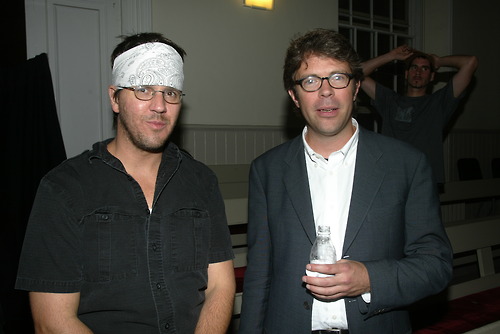
An absolute must-read from the April 18th issue of The New Yorker, Jonathan Franzen’s devastating essay “Farther Away,” detailing his retreat to the ultra-remote South Pacific island of Masafuera in hopes of recovering from the grueling period of Freedom-related work, maybe catching a glimpse of an extremely rare bird, as well as depositing some of his late colleague and friend David Foster Wallace’s ashes. He uses the trip as an opportunity to read Robinson Crusoe and reflect on the nature of isolation, both individually and artistically. About two-thirds of the way through, he launches into a meditation on his friend’s death, which left this blogger in a pool on the ground.
I’ve long made the case for Wallace on this site, and probably inadvertently presented him as some kind of patron saint. Sure, he possessed a sort of moral clairvoyance that was partly characterized by its prophetic heft, not to mention an understanding of the world and himself that went well beyond the diagnostic. But his allure has considerably more dimension than that, and indeed, if it could be boiled down to mere assertions or tenets, he wouldn’t have been much of an artist. It also doesn’t take into account the sheer enjoyment his writing delivers, nor the compassion/empathy it generates, the abreaction that such penetrating humanity affords. In what might be the best article I’ve read this year, Franzen puts it this way:
The people who knew David least well are the most likely to speak of him in saintly terms. What makes this especially strange is the near-perfect absence, in his fiction, of ordinary love. Close loving relationships, which for most of us are a foundational source of meaning, have no standing in the Wallace fictional universe. What we get, instead, are characters keeping their heartless compulsions secret from those who love them; characters scheming to appear loving or to prove to themselves what feels like love is really just disguised self-interest; or, at most, characters directing an abstract or spiritual love toward somebody profoundly repellent… David’s fiction is populated with dissemblers and manipulators and emotional isolates, and yet the people who had only glancing or formal contact with him took his rather laborious hyper-considerateness and moral wisdom at face value.
The curious thing about David’s fiction, though, is how recognized and comforted, how loved, his most devoted readers feel when reading it. To the extent that each of us is stranded on his or her own existential island – and I think it’s approximately correct to say that his most susceptible readers are ones familiar with the socially and spiritually isolating effects of addiction or compulsion or depression – we gratefully seized on each new dispatch from that farthest-away island which was David. At the level of content, he gave us the worst of himself: he laid out, with an intensity of self-scrutiny worthy of comparison to Kafka and Kierkegaard and Dostoyevsky, the extremes of his own narcissism, misogyny, self-deception, dehumanizing moralism and theologizing, doubt in the possibility of love, and entrapment in footnotes-within-footnotes self-consciousness. At the level of form and intention, however, this very cataloguing of despair about his own authentic goodness is received by the reader as a gift of authentic goodness: we feel the love in the fact of his art, and we love him for it…
It is, admittedly, harder to connect with the infantile rage and displaced homicidal impulses visible in certain particulars of his death. But even here I can discern a funhouse-mirror Wallace logic, a perverse sort of yearning for intellectual honesty and consistency. To deserve the death sentence he’d passed on himself, the execution of the sentence had to be deeply injurious to someone. To prove once and for all that he truly didn’t deserve to be loved, it was necessary to betray as hideously as possible those who loved him most, by killing himself at home and making them firsthand witnesses to the act. And the same was true of suicide as a career move, which was the kind of adulation-craving calculation that he loathed in himself and would deny (if he thought he could get away with it) that he was conscious of making, and would then (if you called him on it) laughingly or wincingly admit that, yeah, O.K., he was indeed capable of making. I imagine the side of David that advocated going the Kurt Cobain route speaking in the seductively reasonable voice of the devil in “The Screwtape Letters,” which was one of David’s favorite books, and pointing out that death by his own hand would simultaneously satisfy his loathsome hunger for career advantage and, because it would represent a capitulation to the side of himself that his embattled better side perceived as evil, further confirm the justice of his death sentence…
Adulatory public narratives of David, which take his suicide as proof that (as Don McLean sang of Van Gogh) “this world was never meant for one as beautiful as you,” require that there have been a unitary David, a beautiful and supremely gifted human being who, after quitting the antidepressant Nardil, which he’d been taking for twenty years, succumbed to major depression and was there not himself when he committed suicide. I will pass over the question of diagnosis… and the question of how such a beautiful human being had come by such vividly intimate knowledge of the thoughts of hideous men. But bearing in mind his fondness for Screwtape and his demonstrable penchant for deceiving himself and others – a penchant that his years in recovery held in check but never eradicated – I can imagine a narrative of ambiguity and ambivalence truer to the spirit of his work. By his own account to me, he had never ceased to live in fear of returning to the psych ward where his early suicide attempt had landed him. The allure of suicide, the last big score, may go underground, but it never disappears. Certainly David had “good” reasons to go off Nardil – his fear that its long-term physical effects might shorten the good life he’d managed to make for himself; his suspicion that its psychological effects might be interfering with the best things in his life (his work and his relationships) – and he also had less “good” reasons of ego: a perfectionist wish to be less substance-dependent, a narcissistic aversion to seeing himself as permanently mentally ill. What I find hard to believe is that he didn’t have very bad reasons as well. Flickering beneath his beautiful moral intelligence and his lovable human weakness was the old addict’s consciousness, the secret self, which, after decades of suppression by the Nardil, finally glimpsed its chance to break free and have its suicidal way.

COMMENTS
4 responses to “The Screwtaping of David Foster Wallace – According to Jonathan Franzen”
Leave a Reply
















Was wondering when you were going to post this. It is a wonderful article.